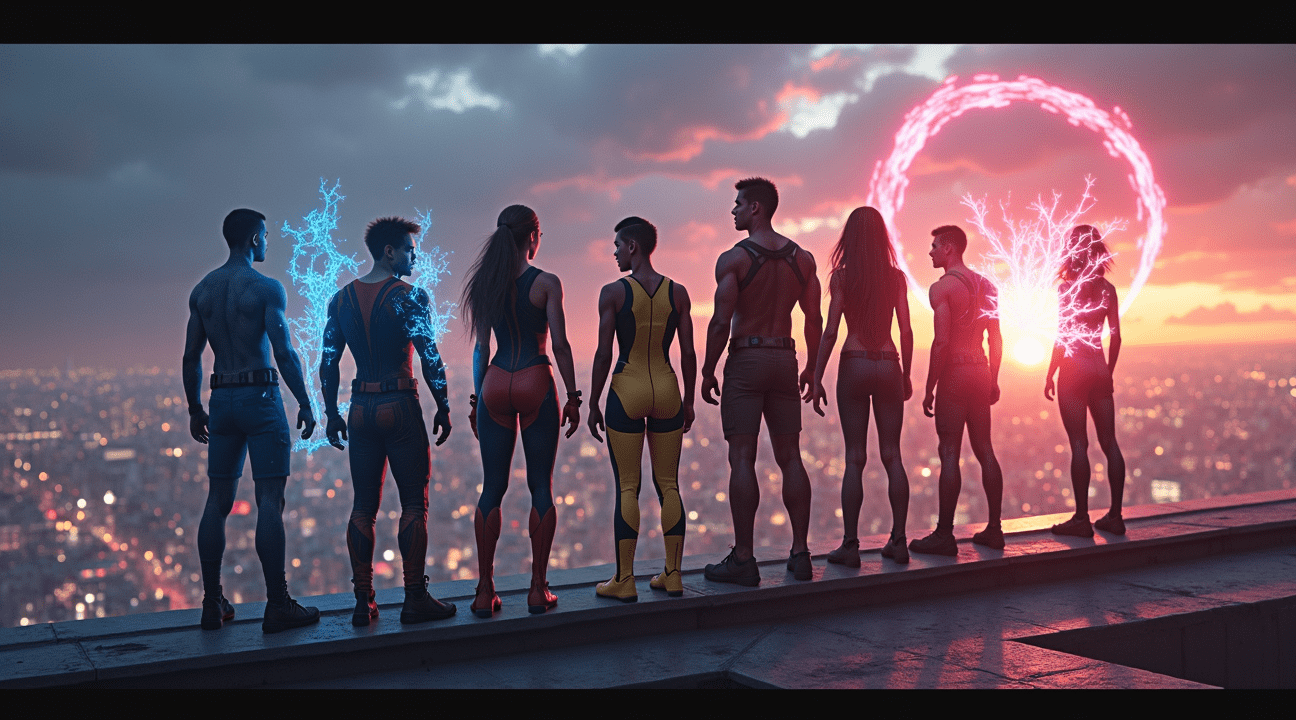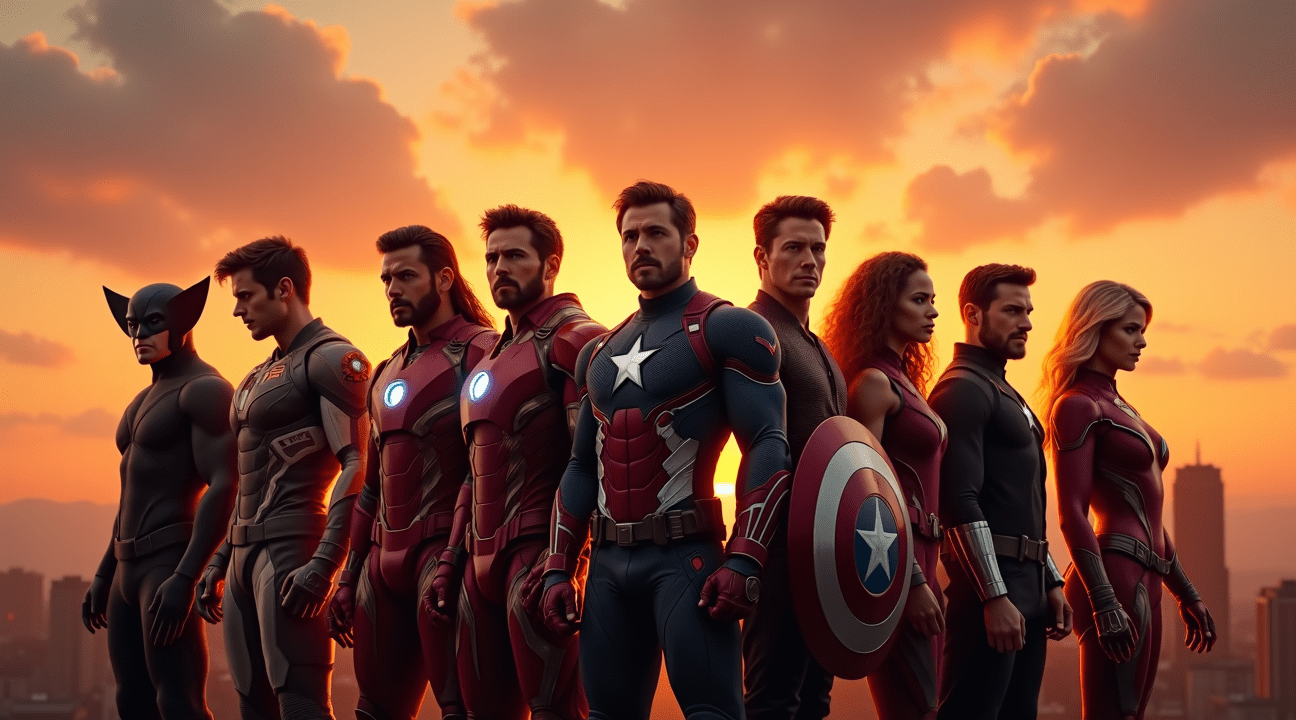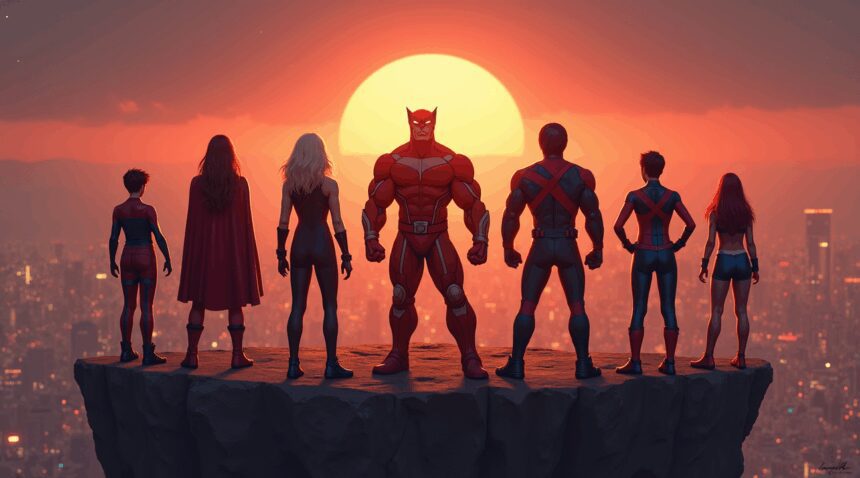Marvel Studios Confirms Full Recast of X-Men for MCU Debut
Kevin Feige has officially confirmed that Marvel Studios will completely recast the X-Men when the mutant team makes its much-anticipated debut in the Marvel Cinematic Universe (MCU), marking a decisive end to years of speculation.
This announcement signals a strategic pivot for Marvel, which has prioritized a “youth-oriented” and comic-accurate approach to the reboot. By choosing fresh talent, the studio aims to establish a new creative foundation for the X-Men, distancing itself from the continuity and character portrayals of the Fox-era films. This bold decision reflects Marvel’s long-term storytelling plans and a desire to cultivate characters that seamlessly integrate into its established cinematic universe.
Key Takeaways
- All X-Men characters will be completely recast for their MCU debut, moving away from any Fox film actors except in specific multiverse scenarios.
- Younger actors will be chosen to create a more comic-accurate and youth-driven team that embodies the X-Men’s traditional themes of identity and belonging.
- Avengers: Secret Wars will serve as the main reset event, setting the narrative groundwork for the mutants’ introduction.
- Jake Schreier is confirmed to direct the rebooted X-Men film, with estimates pointing to a 2028 release.
- The reboot provides access to unexplored storylines and character arcs from decades of original comics.
Why Marvel Is Recasting the X-Men
Marvel’s decision to recast reflects both creative intent and strategic planning. Unlike the Fox films, which frequently portrayed older and more established team members, Marvel’s new direction will focus on teenage and young adult mutants. This aligns with the X-Men’s original comic portrayals—characters grappling with adolescence, powers, and societal rejection.
By doing so, Marvel ensures that its version of the X-Men will echo the emotional resonance and character development that made the comics impactful. It also allows the studio to create a long-lasting ensemble that can grow with the broader MCU timeline.
Leveraging the Multiverse for a Seamless Reboot
Marvel’s multiverse saga, culminating in titles like Avengers: Secret Wars, provides a natural point for introducing the X-Men. This cosmic-level event can reshape the MCU’s continuity and avoids the need for convoluted explanations regarding the mutants’ previous absence in existing films. It opens doors to organic integration without the baggage of Fox-era continuity errors.
Jake Schreier: The Director Behind the Restart
With the announcement of Jake Schreier as director, Marvel signals its confidence in a character-first vision. Known for his deft handling of ensemble casts and emotionally driven stories, Schreier brings experience that aligns with the X-Men’s core themes of unity, trauma, and identity. The projected 2028 release date ensures there is ample time for casting, development, and fan buildup.
Creative Clean Slate and Fresh Storytelling
This reboot grants Marvel the opportunity to visit unexplored characters, themes, and story arcs. Without being bound by previous timelines, relationships, or lore contradictions, the studio can lay the groundwork for new relationships and overarching plots that span multiple MCU phases. This creative freedom benefits both longtime fans and newcomers alike.
Youth-Oriented Casting: A Long-Term Investment
Younger talent not only provides a more accurate depiction of comic characters but also serves practical needs. These actors can commit to long-term contracts that guarantee consistency and allow Marvel to structure multi-phase storylines with continuity and character evolution at the forefront.
Historical Success of Recasting in the MCU
Marvel’s track record with recasting supports confidence in this approach. Characters like Spider-Man and the Hulk have been successfully integrated despite changing actors. Each iteration remained true to the comic source while carving a unique identity within the MCU. The same mastery is expected with the X-Men reboot.
A Fanbase Ready for Change
Although nostalgia for previous portrayals by actors such as Hugh Jackman and Patrick Stewart remains strong, fans largely support the decision. Many agree that a full recast offers a clean slate for the X-Men, better positioning them within the MCU’s future and allowing for stories that are truer to the comics’ spirit.
High-Stakes Casting That Will Shape the Future
The casting process itself is expected to create considerable buzz. The MCU’s reputation for launching global stars will make these roles highly coveted. The X-Men brand carries significant weight in pop culture, and securing top-tier talent ensures strong performances and enduring fan engagement.
A New Era for X-Men Begins
Marvel’s decision to fully reboot the X-Men speaks volumes about its confidence in long-term storytelling and commitment to source material. Instead of retrofitting past versions into the MCU, the studio is opting for authenticity, consistency, and creative clarity. With the right vision, cast, and narrative, the X-Men are poised to become integral pillars of the MCU’s future.
Marvel Studios President Confirms X-Men Will Be Completely Recast for MCU Debut
Kevin Feige officially confirmed in a recent interview that the X-Men will receive a complete recast when they finally launch their own film within the MCU. This announcement puts to rest years of speculation about whether Marvel Studios would continue with actors from previous Fox X-Men films or start fresh with entirely new faces.
Feige described the MCU’s post-Avengers: Secret Wars era as a “reset” rather than a hard “reboot,” indicating that Marvel Studios plans to establish a fresh foundation for the beloved mutant team. This strategic approach allows the studio to distance itself from the mixed reception of recent Fox X-Men films while creating space for their own creative vision.
Comic-Accurate Youth Focus Drives Casting Decision
The recasting strategy centers on Marvel’s desire to create a more comic-accurate, youth-oriented cast that aligns with what Feige calls the “universal story of mutants.” The studio recognizes that the X-Men’s core appeal lies in representing young people who feel different and like outsiders—themes that resonate strongly when portrayed by younger actors.
This approach contrasts sharply with Fox’s later X-Men films, which featured an aging cast and increasingly complex timelines. Marvel’s focus on younger performers will likely bring several advantages:
- Enhanced relatability for younger audiences discovering the characters for the first time
- Longer potential tenure for actors in multi-film contracts
- Fresh interpretations unburdened by previous film continuity
- Opportunity to explore coming-of-age themes central to X-Men lore
The decision also reflects Marvel’s confidence in building from the ground up rather than attempting to integrate existing actors into their carefully crafted cinematic universe. While Hugh Jackman returns as Wolverine for specific multiverse projects, his involvement doesn’t extend to the main MCU timeline where the new X-Men roster will operate.
Feige’s confirmation suggests Marvel Studios has learned valuable lessons from both the successes and failures of previous X-Men adaptations. The studio’s track record with ensemble casting—evidenced by both Avengers films and recent projects—indicates they possess the expertise to assemble a compelling new X-Men team that honors the source material while bringing fresh perspectives to iconic characters.
This complete recasting approach also provides Marvel with creative freedom to explore storylines and character dynamics that might have been constrained by existing actor commitments or audience expectations tied to previous interpretations.
https://www.youtube.com/watch?v=5GSnCzPJU6oiDM
Why Marvel Is Starting Fresh Instead of Building on Fox’s Legacy
Kevin Feige’s decision to recast the X-Men represents a calculated move that acknowledges both the franchise’s extensive history and Marvel’s vision for the future. The X-Men have appeared in more films than Spider-Man or the Fantastic Four, creating a complex legacy that spans over two decades. However, this extensive filmography also presents unique challenges that Marvel Studios is addressing through a complete creative reset.
Breaking Free from Previous Interpretations
Feige has made it clear that the new MCU version will embrace the source material more faithfully than previous iterations, particularly those directed by Bryan Singer. The Fox X-Men films, while commercially successful, often diverged significantly from comic book storylines and character interpretations. This departure from source material left numerous iconic stories unexplored and characters underdeveloped.
The studio’s approach allows them to tap into decades of untapped comic book narratives that fans have been eager to see on screen. Stories like the Dark Phoenix Saga, which Fox attempted twice with mixed results, could receive proper treatment under Marvel’s stewardship. Additionally, characters like Storm, Cyclops, and Jean Grey can be portrayed with the depth and complexity they deserve.
Strategic Recasting Across the MCU
Marvel’s recasting strategy extends beyond the X-Men and reflects a broader pattern within the MCU. The studio has successfully managed transitions with other major characters, preparing for inevitable changes as actors age out of their roles or choose to move on. Recent developments, including the upcoming Deadpool 3 and discussions about potential Wolverine casting, demonstrate Marvel’s willingness to reimagine beloved characters.
The recasting also addresses practical concerns about working with established actors who’ve been portraying these roles for years. Many of the Fox X-Men cast members have aged significantly since their first appearances, and some have expressed interest in moving beyond superhero films. Starting fresh allows Marvel to cast younger actors who can commit to the long-term storytelling that the MCU demands.
This clean slate approach enables Marvel to introduce the X-Men without the baggage of previous continuity issues that plagued Fox’s later films. The studio can:
- Establish proper character relationships
- Explore team dynamics that were never fully developed
- Create connections with existing MCU characters
Feige’s emphasis on honoring the source material suggests that fans will finally see the X-Men they’ve been waiting for, unburdened by previous creative limitations and free to reach their full potential within the MCU framework.
https://www.youtube.com/watch?v=G962fV3q-mALKM
What We Know About the New X-Men Movie Timeline and Creative Team
Marvel Studios hasn’t announced an official release date for the MCU’s X-Men film, but industry expectations point to a 2028 launch window. This timeline allows the studio to properly establish the groundwork through upcoming projects and ensure the mutants receive the treatment they deserve.
Director and Creative Vision
Jake Schreier has been confirmed to helm the rebooted X-Men movie, bringing his proven track record to Marvel’s most anticipated property. The studio described their vision as “very youth-oriented,” signaling a deliberate shift in casting strategy that mirrors the original comic book origins. This approach makes sense given that Stan Lee and Jack Kirby initially conceived the X-Men as teenagers and young adults facing both supernatural threats and coming-of-age challenges.
Casting choices will likely favor younger actors who can grow with their characters across multiple films. This strategy proved successful with Spider-Man, where Tom Holland’s youthful energy helped redefine the character for a new generation. The youth-oriented approach also creates opportunities for long-term character development and allows audiences to connect with the mutants’ struggles of identity and acceptance.
Timeline and Continuity Reset
Avengers: Secret Wars will serve as the crucial reset point that clarifies continuity issues and creates space for the X-Men’s introduction. This storyline offers Marvel the perfect opportunity to address the complex multiverse elements while establishing clear rules for how mutants fit into the MCU moving forward.
The reset essentially gives the studio a clean slate to work with. Rather than attempting to weave the X-Men into existing MCU history, Secret Wars allows for a fresh start that can establish mutants as having always been part of this universe. This approach eliminates the narrative gymnastics required to explain their absence during previous world-threatening events.
While fans wait for 2028, Marvel continues building excitement around other mutant-related projects. Deadpool 3 and its various casting surprises, including Hugh Jackman’s return, demonstrate how the studio can honor previous incarnations while building something entirely new. Even unexpected casting discussions, like the petition for Danny DeVito to play Wolverine, show the passionate fan engagement surrounding these characters.
The youth-oriented approach combined with Schreier’s direction suggests Marvel intends to capture both the spectacle and emotional depth that makes X-Men stories compelling. This isn’t just about superpowers and action sequences—it’s about creating authentic characters whose struggles resonate with audiences facing their own challenges with identity and belonging.

How X-Men Recasting Fits Marvel’s Broader Strategy for Legacy Characters
Marvel Studios has adopted what can be described as a ‘James Bond’ model for handling legacy characters, refreshing cast members while preserving each character’s fundamental essence. This strategic approach allows the studio to introduce new interpretations without abandoning decades of character development that fans cherish.
The Fantastic Four exemplifies this philosophy in action. Pedro Pascal has stepped into Reed Richards’ role, while Vanessa Kirby takes on Sue Storm, marking a complete departure from previous Fox iterations. This fresh casting demonstrates Marvel’s commitment to bringing new energy to established properties rather than simply carrying over existing portrayals.
Legacy Recasting Extends Beyond X-Men
Several major Avengers characters will follow this same trajectory in upcoming MCU phases. The studio has confirmed plans to recast iconic roles like Iron Man and Captain America, treating these positions as mantles that can be passed between different actors and interpretations. This approach ensures continuity in storytelling while allowing for creative evolution.
I see Marvel’s strategy as particularly smart given the mixed reception of recent developments. While some fans continue to advocate for unconventional casting choices like the Danny DeVito Wolverine petition, the studio remains focused on finding actors who can embody these characters for multiple film cycles.
The X-Men recasting fits perfectly within this established pattern. Rather than attempting to integrate Fox’s existing cast into the MCU’s different tone and storytelling approach, Marvel can build fresh dynamics that serve their long-term vision. This strategy proved successful with Spider-Man, where Tom Holland’s portrayal brought new energy to the character after previous iterations.
Kevin Feige’s comments suggest the studio recognizes that certain characters have become bigger than any single actor’s interpretation. Hugh Jackman’s departure from Wolverine opened the door for this approach, though actors like Keanu Reeves have expressed interest in taking on the role.
The recasting strategy also provides creative freedom for directors and writers. They can develop storylines without being constrained by previous character arcs or actor availability. This flexibility becomes crucial as Marvel expands into different genres and storytelling formats across their various properties.
Marvel’s approach demonstrates confidence in their ability to find actors who can honor these characters’ legacies while bringing fresh perspectives. The studio’s track record with recasting suggests audiences will embrace new interpretations when they’re well-executed and respect the source material’s core elements.

High Stakes and Fan Expectations for Marvel’s Mutant Universe Return
Marvel Studios faces unprecedented pressure as they prepare to introduce their own version of the X-Men to the MCU. The studio’s decision to recast the entire mutant roster represents both a massive opportunity and a significant risk in today’s competitive superhero landscape.
Balancing Legacy and Innovation in Character Development
The recasting strategy aims to captivate both long-time comic fans and new audiences, creating space to introduce both classic and lesser-known mutant characters. This approach allows Marvel to build fresh narratives while honoring decades of source material that has defined the X-Men franchise. Fans who have followed the mutants since their comic debut in 1963 expect authentic characterizations, while newer audiences seek the same level of storytelling excellence they’ve come to associate with previous MCU entries.
Marvel’s creative team understands they must strike a delicate balance between nostalgia and innovation. The studio has demonstrated this skill before with successful character reinventions, though none have carried the weight of expectation that comes with the X-Men property. Previous Fox films established strong audience connections with certain portrayals, making the transition particularly challenging for Marvel Studios.
Strategic Response to Industry Evolution and Acquisition Pressure
Marvel remains acutely aware of the high expectations following Disney’s 2019 acquisition of 21st Century Fox, which put film rights to mutants back with Marvel Studios. This acquisition represented more than a business transaction—it marked the return of some of Marvel’s most beloved characters to their creative home. The pressure to justify this massive investment weighs heavily on every creative decision moving forward.
The recasting and new direction reflect Marvel’s intent to remain culturally relevant and innovative, as the superhero movie landscape continues to evolve. Studios across the industry have learned that audiences no longer accept subpar storytelling simply because beloved characters appear on screen. This reality has pushed Marvel to approach the X-Men with the same strategic thinking that made Deadpool 3 such an anticipated project.
Current market conditions demand that superhero films deliver both spectacle and substance. Audiences have become increasingly sophisticated in their expectations, requiring stories that resonate on emotional levels while providing the action sequences they crave. Marvel’s mutant universe reboot must address social themes that have always been central to X-Men mythology while fitting seamlessly into the established MCU timeline.
The studio’s track record with character introductions provides some confidence, though the X-Men represent a unique challenge due to their ensemble nature. Unlike introducing individual heroes like Spider-Man or Captain Marvel, the mutant universe requires establishing multiple complex characters simultaneously while building the broader concept of mutant-human relations that defines the franchise.
Fan communities have already begun speculating about casting choices and storyline directions, creating an environment where every announcement will face intense scrutiny. Social media amplifies both positive and negative reactions, making the stakes even higher for Marvel’s creative decisions. The studio must navigate these expectations while maintaining the creative freedom necessary to produce compelling content.
Success with the X-Men reboot could establish Marvel’s dominance in the superhero genre for another decade. Failure, however, could damage the studio’s reputation and waste one of comics’ most valuable properties. This pressure has led to careful planning and extensive development phases that prioritize story quality over quick market entry.
The entertainment landscape has shifted dramatically since the original X-Men films debuted, with streaming platforms and changing audience preferences requiring new approaches to character development and story structure. Marvel’s mutant universe must account for these changes while respecting the core elements that made these characters enduring cultural icons.
https://www.youtube.com/watch?v=V_gH-b24y1En6M
Sources:
Screen Rant – MCU X-Men Casting Future: Kevin Feige, Avengers: Secret Wars
Motion Picture Association – Marvel Boss Kevin Feige Talks Fantastic Four Recasting, A New Tony Stark, Rebooting the X-Men & More
ComicBookMovie.com – Kevin Feige Promises Comic-Accurate X-Men in Reboot After Confirming Jake Schreier Will Direct the Movie
The Playlist – Kevin Feige: Blade Delays, Kang, Doom, X-Men Reboot & Recasting
Men’s Journal – Marvel Boss Confirms Recasting 2 Avengers, Compares Search to a New James Bond
Consequence – Kevin Feige Hints at Eventual Recasting of Iron Man and Captain America


